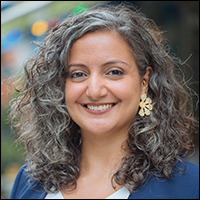Hiba Baroud, A. James and Alice B. Clark Foundation Faculty Fellow and associate chair of Civil and Environmental Engineering, has been appointed as a fellow of the International Science Council in recognition of outstanding contributions to promoting science as a global public good. She is among the 100 fellows appointed by the Council.

The fellowship is the highest honor that can be conferred on an individual by the ISC. The fellows will support the Council “in its mission at a critical moment for science and sustainability for science as we enter the UN’s International Decade of Sciences for Sustainable Development (IDSSD) in 2024,” according to an ISC release.
The new fellows include eminent social and natural scientists, thought leaders, policymakers, and engineers among others from various countries, regions, and disciplines, who have contributed to society through their works.
“I’m deeply honored and excited to be selected as a fellow of ISC. Through interdisciplinary and international collaboration, I aim to bridge the gap between science, policy, and technology to promote climate solutions and address the urgent challenges our world faces,” Baroud said.
Last year, Baroud was selected for membership in the Global Young Academy where she co-leads the Working Group on Climate Change and Disaster Risk Reduction. She joins the world’s top 200 young researchers and professionals to contribute innovative and creative solutions that address critical global challenges. She was recognized for her pioneering research in understanding the resilience of infrastructure to climate-driven disasters and the tools and methods she has developed to support decision makers in communities who rely on this infrastructure. She has exercised her methods in communities round the world, including in Bangladesh, Sri Lanka, Jordan and Guatemala.
Baroud received a NSF Faculty Early CAREER Development grant in 2020. She was the recipient of the inaugural Littlejohn Dean’s Faculty Fellowship, an endowed fellowship for junior faculty members, and was in the first cohort of the Chancellor’s Global Voices Fellowship, a semester-long program designed to expand Vanderbilt’s global reach by amplifying the impact of faculty academic research.
Baroud’s work explores data analytics and statistical methods to measure and analyze the risk, reliability, and resilience in critical infrastructure systems. Her interdisciplinary research investigates network interdependencies across infrastructure, environmental, and social systems with a focus on applications in disaster management and climate adaptation. She joined the Vanderbilt School of Engineering in 2015.
The ISC is the only international non-governmental organization (NGO) bringing together international scientific unions and associations, as well as national and regional scientific organizations such as academies and research councils from the natural sciences, social sciences, and the humanities. The U.S. National Academy of Sciences is a member.
Contact: brenda.ellis@vanderbilt.edu